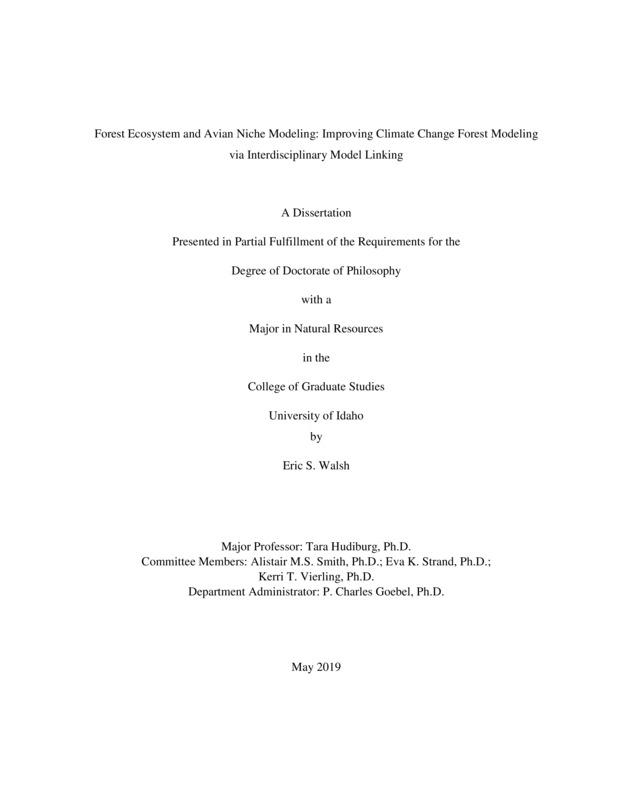Forest Ecosystem and Avian Niche Modeling: Improving Climate Change Forest Modeling via Interdisciplinary Model Linking
Walsh, Eric S.. (2019-05). Forest Ecosystem and Avian Niche Modeling: Improving Climate Change Forest Modeling via Interdisciplinary Model Linking. Theses and Dissertations Collection, University of Idaho Library Digital Collections. https://www.lib.uidaho.edu/digital/etd/items/walsh_idaho_0089e_11511.html
- Title:
- Forest Ecosystem and Avian Niche Modeling: Improving Climate Change Forest Modeling via Interdisciplinary Model Linking
- Author:
- Walsh, Eric S.
- Date:
- 2019-05
- Keywords:
- Avifauna Biodiversity Biogeochemistry Idaho Northern Rockies
- Program:
- Environmental Science
- Subject Category:
- Forestry; Ecology; Biogeochemistry
- Abstract:
-
Climate change is impacting forest structure and processes, and more than half of the forested land cover of North America will experience future climates that differ from historical growing conditions. Forest composition and structure are integral to biodiversity, however, climate change induced declines in tree species occurrence, increases in forest mortality events, and increases in burned area will have biodiversity implications. Process-based forest landscape models provide a means to evaluate forest structure, composition, and biogeochemical responses to climate change, while providing data to secondarily model biodiversity responses. This dissertation focuses on integrating forest landscape and avian niche models to evaluate the effects of climate change on the Northern Rockies Ecoregion of Idaho, USA.
Chapter 1 addresses the rational for integrating avian cavity nester niche models with forest landscape models. I introduce the conceptual climate-woodpecker-forest model and conduct a literature review of ongoing and projected responses of woodpeckers to climate change. I found that projections are not always in agreement with observed contemporary trends, and the ecological constraints associated with contemporary woodpecker niches are not being integrated into climate-based projection models. I conclude that the coupling of woodpecker niche models with finer scale process-based vegetation models is a way to better approximate the key ecological constraints of woodpeckers. This coupling will then provide a functional measure of biodiversity in multi-objective ecosystem modeling frameworks.
In Chapter 2, I propose a framework to integrate avifauna niche and forest landscape models. The framework implements a process to 1) aid in selecting available and appropriate niche models for a study region; 2) evaluate the transferability of a niche model when developed in a region outside of the focal study area; 3) derive niche model predictor variable parameterizations from the forest landscape model when the outputs of the forest landscape model cannot directly inform the avian niche model; 4) compare the forest landscape modeled avian niche response to the response derived from the original niche model parameterizations. Through implementation of this process using two avian cavity nester species and the forest landscape model LANDIS-II, I found model selection and transferability are the primary limiting factors to integration. Secondarily, species that are spatially irruptive because of the dynamics of habitat condition still benefit from this model integration. The spatial extent of core habitat features of these species, which are a product of long term management decisions, can be identified and further evaluated through time using forest landscape model scenarios. Overall, the framework provides a viable process to model integration.
In Chapter 3, I apply LANDIS-II to the Northern Rockies Ecoregion to evaluate the effects of climate change, fire disturbance, and harvest disturbance on the forest composition, structure, and biogeochemical dynamics of the region. I integrate the avifauna niche models from Chapter 2 into the modeling scenarios to provide a measure of biodiversity response. The Northern Rockies Ecoregion is projected to …
- Description:
- doctoral, Ph.D., Environmental Science -- University of Idaho - College of Graduate Studies, 2019-05
- Major Professor:
- Hudiburg, Tara
- Committee:
- Smith, Alistair M.S.; Strand, Eva K.; Vierling, Kerri T.
- Defense Date:
- 2019-05
- Identifier:
- Walsh_idaho_0089E_11511
- Type:
- Text
- Format Original:
- Format:
- application/pdf
- Rights:
- In Copyright - Educational Use Permitted. For more information, please contact University of Idaho Library Special Collections and Archives Department at libspec@uidaho.edu.
- Standardized Rights:
- http://rightsstatements.org/vocab/InC-EDU/1.0/

